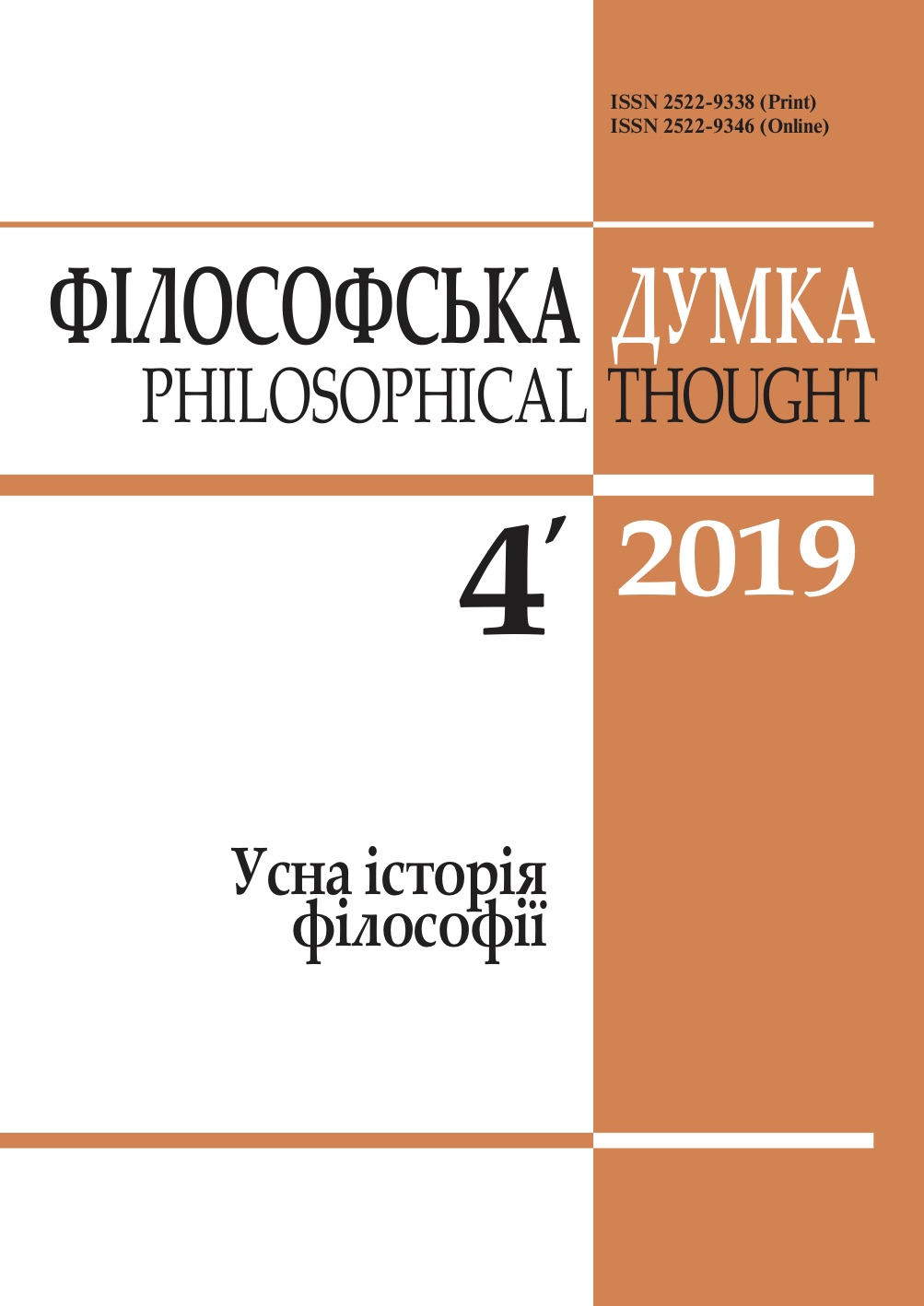A word to Heidegger? The limits of tolerance in the oral history of philosophy
DOI:
https://doi.org/10.15407/fd2019.04.081Keywords:
interview, ethics, propaganda, Martin Heidegger, Nazism, Barbara Cassin, Alain BadieuAbstract
The beginning of the new realm in philosophical research, which is the oral history of phiosophy, is followed by the consequential set of serious ethical issues. The purpose of this article is to identify moral orientations a historian of philosophy can rely on in oral communication with respondents. The starting point of the analysis is the ethical standards of interviews developed by the Oral History Society. An example to test these standards based on the principle of maximum tolerance is the case of Martin Heidegger. Considering the ambiguity of some outstanding philosophical figures, the main task of the article is to find the line between propagation of the dangerous views of the philosopher and objective philosophical analysis. As a guide to the ethics of interviewing philosophers, I propose the approach suggested by Alain Badieu and Barbara Cassin regarding Heidegger. They claim that a great philosopher can simultaneously be a Nazi and an anti-Semite. I outlined the general feature of interaction with ambiguous personalities in a philosophical interview: (1) the interviewer should not make extreme judgments in advance; (2) We have no right to remove some ambiguous philosophers from discourse, and communication with them is a personal matter of the interviewer. But philosophical community should produce the criteria for exact distinction between the sphere of ethically unacceptable and realm of uncertain.
References
Aeschimann, E., Cassin, B. (2014, September 20). Barbara Cassin: “Nous savions tous que Heidegger avait été nazi”. Retrieved June 20, 2019 from bibliobs.nouvelobs website: https://bibliobs.nouvelobs.com/essais/20140919.OBS9704/barbara-cassin-nous-savions-tous-que-heidegger-avait-ete-nazi.html?fbclid=IwAR3DHDGYGyY61Kl2EMfVCfyGXanpIJPTrH2nF1Hk37%20SCX7IMKrNqrm%205XgYg
Badiou, A. (2014, 21 December). A letter. Retrieved from: https://www.versobooks.com/blogs/1796-a-letter-from-alain-badiou
Badiou, A., Cassin, B. (2016). Heidegger: His Life and His Philosophy. New York: Columbia University Press. https://doi.org/10.7312/badi15796
Boss, M. (2001). Preface to the American translation of Martin Heidegger’s Zollikon Seminars. In M. Heidegger, Zollikon Seminars: Protocols, Conversations, Letters. Evanston: Northwestern University Press.
Cassin, B., Ivry, B. (2018, 13 September). Barbara Cassin: What Hannah Arendt Could Teach Israel. Retrieved from: https://forward.com/culture/410055/barbara-cassin-what-hannah-arendt-could-teach-israel/
Heidegger, M. (1981). Only a God Can Save Us. In T. Sheehan, Heidegger: The Man and the Thinker (pp. 45-67). Chicago: Precedent.
Jessee, E. (2011). The Limits of Oral History: Ethics and Methodology Amid Highly Politicized Research Settings. The Oral History Review. 38(2), 287-307. https://doi.org/10.1093/ohr/ohr098
Sharpless, R. (2006). The History of Oral History. In T. L. Charlton, L. E. Myers, & R. Sharpless (Eds.), Handbook of Oral History. Rowman: Altamira Press.
Sheftel, A., Zembrzycki, S.. (2016). Who’s Afraid of Oral History? Fifty Years of Debates and Anxiety about Ethics. Oral History Review, 43(2), 338-366. https://doi.org/10.1093/ohr/ohw071
Wheeler, M. (2018, Winter). Martin Heidegger. Retriewed from The Stanford Encyclopedia of Philosophy website: https://plato.stanford.edu/archives/win2018/entries/heidegger/
Wolin, R. (2014, Summer). National Socialism, World Jewry, and the History of Being: Heidegger’s Black Notebooks. Retriewed from Jewish Review of Books website: https://jewishreviewofbooks.com/articles/993/national-socialism-world-jewry-and-the-history-of-being-heideggers-black-notebooks/
Downloads
-
PDF (Українська)
Downloads: 334
Published
How to Cite
Issue
Section
License
Authors who publish with this journal agree to the following terms:
- Authors retain copyright and grant the journal right of first publication.
- Authors are able to enter into separate, additional contractual arrangements for the non-exclusive distribution of the journal's published version of the work (e.g., post it to an institutional repository or publish it in a book), with an acknowledgement of its initial publication in this journal.
- Authors are permitted and encouraged to post their work online (e.g., in institutional repositories or on their website) prior to and during the submission process, as it can lead to productive exchanges, as well as earlier and greater citation of published work (See The Effect of Open Access).


